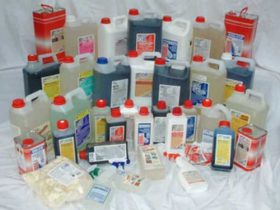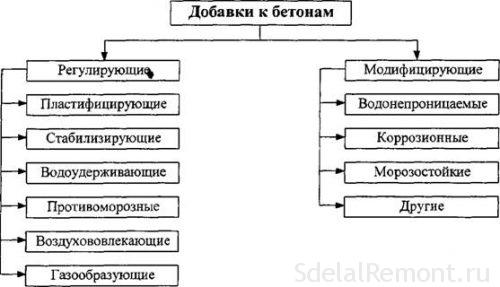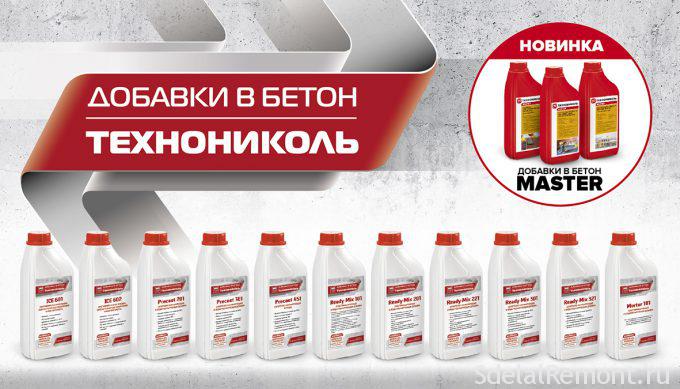The range of concrete mixtures, offered on today's construction market, It filled with not only a variety of concrete plasticisers, but also various additives thereto attendant. For the reason that, often compressed construction time, and foundation design requires special strength, use special concrete additives, that can accelerate the hardening of the material or to carry out work in the winter time.
What are additives for concrete?
Adding special plasticizers in concrete, increases the strength and ductility of the material, Besides, Each supplement has its specific properties, makes it indispensable in different conditions of construction. Correctly matched admixture for concrete to achieve maximum effect. In the modern classification, Concrete additives are the following:
- modifiers - designed to increase the strength and stability of concrete, extend its life, and also make it mobile, which facilitates construction;

- plasticizers - one of the most popular types of additives, which reduce the rate mixture, thus giving the finished concrete water resistance and the lack of fiber bundles;
- mobility controllers - are used for, to provide concrete plasticity, eg, in conditions of extreme heat;
- antifreeze additives - the use of such additives in the minus temperature, the water has time to get to grips with the cement, before his freezing;
- Additives for accelerating the solidification - during solidification,penetrate into the smallest pores of the material, than increase the reliability of the finished concrete;
- additives for self-compacting concrete - used for pouring thin structures.
There are also special pigment additives for concrete, who dyed it in the color you want. It would seem that, what concrete color, because the coating will still be closed finish. but, such pigments are used for the concrete mixtures, of which produce paving slabs or self-leveling floor. As part of these additives contain substances, resistant to sunlight and alkalis.
Classification additives in chemical composition
Depending on the presence of a chemical substance in the additive, it can be used for different conditions. Additives are divided according to the principle main action effect, Which can:
- reduce separation of the liquid from the solution;
- stabilizing material, not giving it to delaminate;
- increase the plasticity and fluidity mixture;
- add function waterproofing concrete mix - good additives for basements;
- slow down the process of hardening concrete;
- accelerate the solidification of the mass;
- align on the surface deformation;
- allow to carry out work in freezing temperatures;
- to increase the porosity of the finished concrete;
- improve the resistance to corrosion, harsh environment.
Besides, the market of building materials are offered for sale, concrete additives, having in its composition a whole range of substances, which have different effects on concrete. Such additives are used, when you want to achieve several effects.

Advantages of different kinds of additives
The mechanism of action and effect of the use of a different type of additive, so each of them has its advantages:
- Additives - plasticisers. These masses have some degree of impact: weak, average, strong and superplastifikatsiyu. Each of them is used depending on the requirements, predъyavlyaemыh ready for concrete. Plasticizer saves the consumption of concrete, increases its density, and resistance to frost, prevents cracks, and gives a mixture of mobility. In connection with such an abundance of advantages, there is one drawback - the duration of mass curing. To this end, experts recommend to additionally use the concrete hardening accelerators.
- Concrete Modifiers. These additives significantly increase the life of the finished concrete service, increase the structural strength and make it watertight.
- antifreeze additive. At the heart of the action on the principle of lowering the freezing temperature of liquid, while the concrete hardens at lower degrees. The temperature for the work varies -15 to -25 degrees, that allows you to pour concrete, even in cold weather.
- hardening accelerator. In the compositions of additives contained chlorine in conjunction with other components: calcium, sodium or other salts. When these substances affect the concrete, hardening process is accelerated. It is used to fill the foundation for the pool, reinforced concrete structures, and structures, requiring a multi-layer concrete pouring;
- Retardants concrete solidification. Produce the opposite effect, than previous additives. Very easy to transport ready-mixed concrete over long distances, to avoid premature hardening. Also used in multilayer constructions, to avoid cracks mezhduprisadochnyh;
- Air entraining agents. When such an additive is applied to the concrete mixtures, it is filled with air and the particles becomes porous structure. This is useful in case, When necessary to increase the frost resistance of the concrete mixtures. Besides, such additives increase the service life of concrete and its water resistance.
Overview of manufacturers and the average cost of additives
At present, the largest domestic manufacturer of concrete admixtures are called the company "Polyplast". This company produces a variety of additives, under the brand names "Linamix", "AEROPLAST" and "Krioplast".

Next in terms of manufacturer brand is "Superplast". Followed by such companies as "Fort", "Biotech" and "Alliance".
Available supplements can meet, packaged in bags 25 kg, as well as in cans 1,5 l and 10 l. Antifreeze additives are more affordable in price - from 30 to 50 rubles for 1 kg. plasticizers, retarders and accelerators of hardening are within the price range 60-90 rubles for 1 kg.
complex supplements, providing multiple actions, selling price 70-110 rubles / kg. The most expensive are air-entraining compositions, the price of 200 to 300 rubles / kg.
Choosing the additive into the concrete mix, it is best to begin to study its composition and reviews, because the low cost options are not always quality. When used alone impurities, Observe carefully proportions and a method of mixing the material, indicated on the packaging. Due to the plasticizers and additives you can easily do floor screed.












